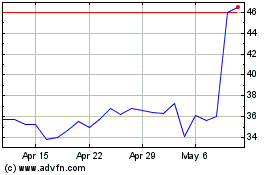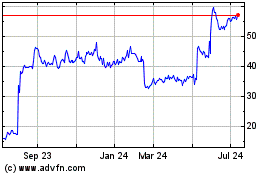Consumer Benefit From AT&T, T-Mobile Deal Is Questionable
March 21 2011 - 3:37PM
Dow Jones News
AT&T Inc.'s (T) surprising announcement that it would
acquire T-Mobile USA raises one big question for consumers: What
will happen to wireless pricing and service?
The planned $39 billion deal will mesh together the second- and
fourth-largest U.S. mobile carriers, creating a behemoth that's
likely to have nearly 130 million customers. The deal could help
AT&T improve its network capabilities, which have long been
criticized ever since the launch of Apple Inc.'s (AAPL) iPhone in
2007, but any potential service enhancements may come with the
added burden of higher prices.
"It's no secret that AT&T has had issues with network
quality over the last few years," said Brian Fino, managing
director at Fino Consulting. "This is great news in terms of the
network capacity that AT&T will be able to provide its
customers. But people will probably have to pay a little bit more
for better coverage."
The iPhone and other smartphones have created an exponential
increase in data that have crimped AT&T's network. AT&T and
T-Mobile say their customers will see service improvements,
including better voice quality, based on additional spectrum and
synergies related to network infrastructure.
The deal, which isn't expected to close until early next year,
won't change much for consumers in the short term. T-Mobile doesn't
currently carry the iPhone, and its customers won't likely have
access to it until the deal closes and T-Mobile customers are
folded into the AT&T universe.
But the deal raises many long-term pricing questions. Critics
argue that eliminating T-Mobile, which has long undercut the
industry average on data-plan pricing, will lead to higher prices
for consumers amid wireless consolidation.
"T-Mobile was always a very good value provider," said Charlie
Golvin, an analyst at Forrester Research. "We're going to see fewer
options on the low end for contract customers."
T-Mobile has been known for its cheaper data offerings compared
with AT&T and Verizon Wireless and has even run an advertising
campaign that belittled other national carriers.
AT&T, in defending the legality of the deal, has argued that
18 of 20 major markets have at least five competitors each,
suggesting that market forces will keep it price competitive.
Shares of smaller prepaid wireless companies such as MetroPCS
Communications Inc. (PCS) and Leap Wireless International Inc.
(LEAP) as well as rural cellphone providers like U.S. Cellular
Corp. (USM) are up Monday based partly on how this deal could
create a growing opportunity for them to take market share.
"There will always be a check and a balance when it comes to
pricing dynamics," said Howard Loewenberg, managing director at
Signal Hill Capital.
To be sure, some analysts suggest consolidation within the
telecom industry won't necessarily be bad for consumers.
"It's not obvious that less competition will translate into
higher consumer prices," said Craig Moffett, an analyst at Sanford
C. Bernstein. "The knee-jerk reaction is that consolidation leads
to pricing power. But in a scale-intensified business like telecom,
consolidation also leads to lower costs."
He said the real question is whether or not the synergies
inherent in a transaction on this grand scale get passed onto
consumers.
"It's quite possible that you could get attractive economics for
the carriers and higher margins as well as lower prices for
consumers," he said.
-By Steven Russolillo, Dow Jones Newswires; 212-416-2180;
steven.russolillo@dowjones.com
US Cellular (NYSE:USM)
Historical Stock Chart
From Mar 2024 to Apr 2024

US Cellular (NYSE:USM)
Historical Stock Chart
From Apr 2023 to Apr 2024
